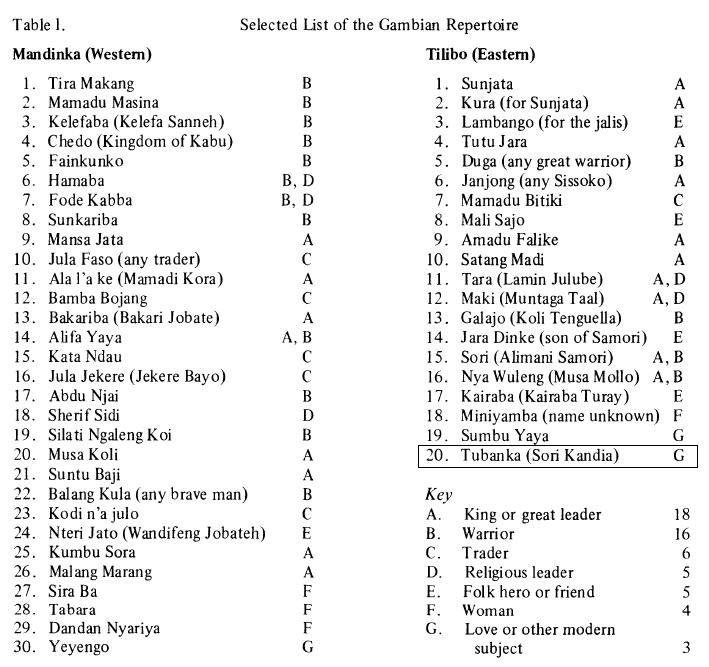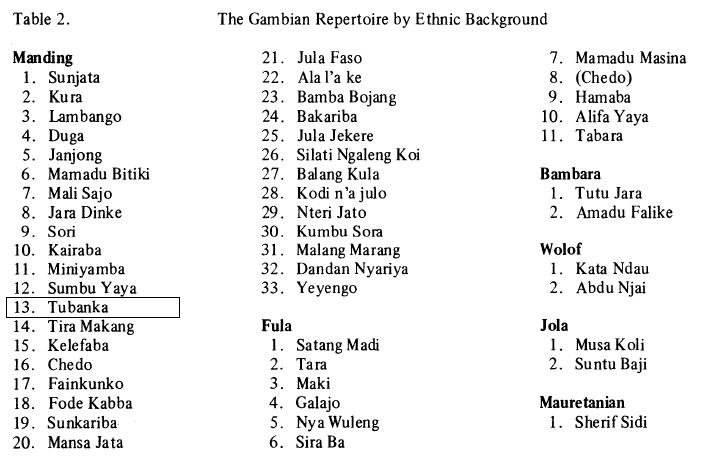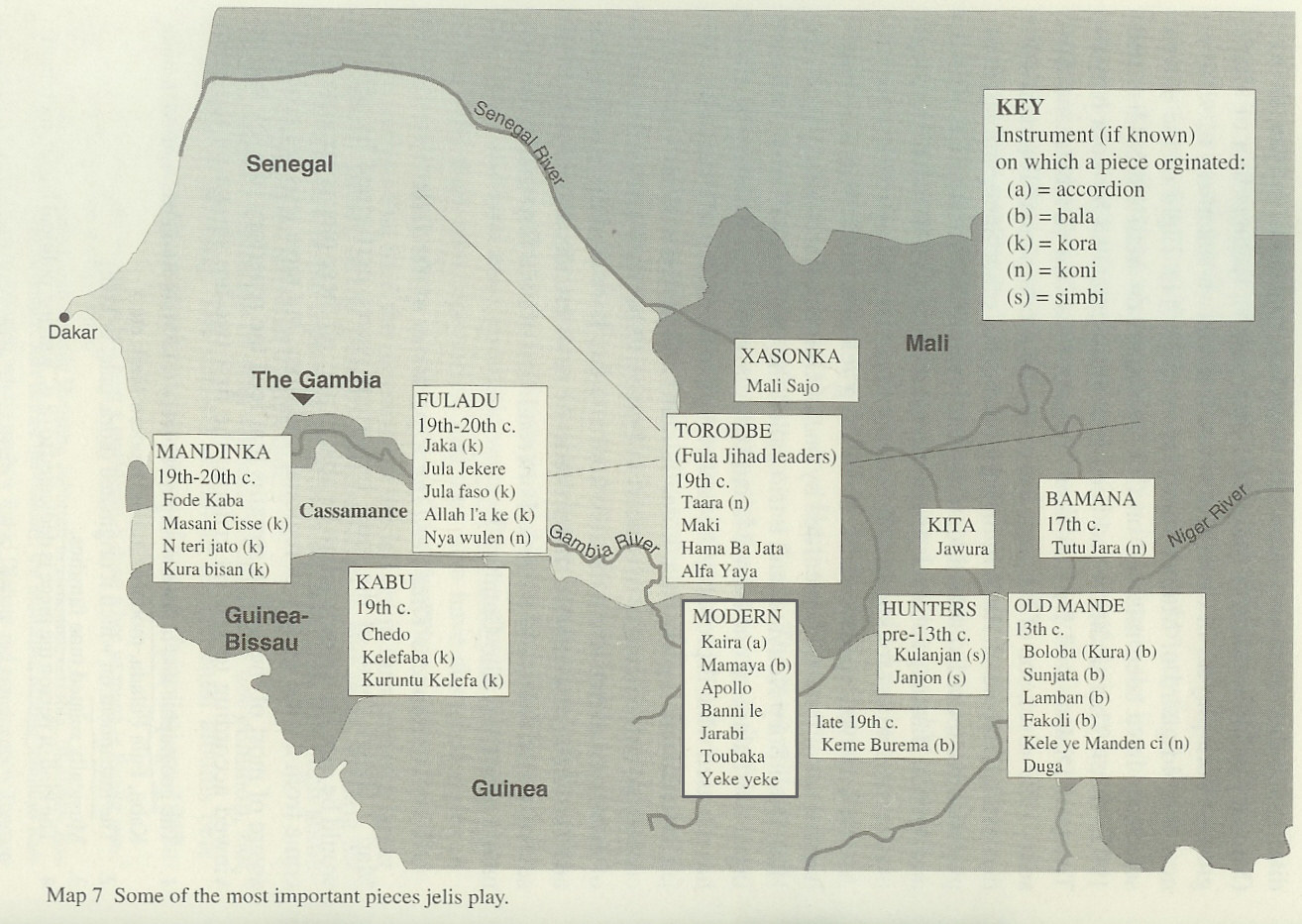tubaka
Sacko, Fanta. 1972. Musique du Mali. Vol. 1. Fanta Sacko. Barenreiter Musicaphon, BM 30L 2551.
(Tubaka)
A Malinké song dedicated to a loved girl. It tells her among other things:
The oldest word
Is undoubtedly the word "love",
Forgive me, my beloved one,
If I have hurt you.
I am coming to you, my beloved one.
Not in order for you to give me anything,
I am coming to you, my beloved one,
Simply because I love you.
And may you know, o my beloved one,
That the first characteristic
Of nobility
Is the respect for one's pledge.
And since people are not all alike
Do not rank me, o my love,
With those who deny their promises.
African Virtuoses (Sekou "Docteur" and Abdoulaye Diabate, Sekou Kouyate). 1983. African Virtuoses. JBZ.
(Toubaka)
Toubaka is another 20th century Guinean favorite that has enjoyed widespread circulation (including a version sung by Salif Keita with Les Ambassadeurs). The unique four-chord pattern has challenged several generations of guitarists. Following his solo and an ensemble break, Abdoulaye plays one of those trademark Guinean non-stop accompaniment patterns that subtly winds its way through the chord changes while Sekou solos.
Knight, Roderic. 1982a. "Manding/Fula Relations as Reflected in the Manding Song Repertoire." African Music 6 (2): 37–47.
(Tubanka)
p. 39
Table One . . . includes the best known, most often heard, or otherwise significant songs in the [Gambian] repertoire. In each column the top few songs are the oldest, and the bottom few are the youngest. The majority in each case fall somewhere in between (often in the nineteenth century), but no chronological ordering beyond this is intended, since it is often not possible to date a song exactly. Most of the songs bear the name of their owner as the title. Where they do not, his name is shown in parentheses next to the title. The letter code at the right represents the person's "claim to fame" or calling in life, as shown in the bottom of the list.

p. 40
Table Two shows the same fifty songs again, grouped this time by the ethnic background of the people commemorated.

Jessup, Lynne. 1983. The Mandinka Balafon: An Introduction with Notation for Teaching. La Mesa, Calif.: Xylo.
(Tuubanka)
pp. 146–59 (Appendix 2: Balafon Repertoire)
| Title | Tuubanka |
| Translation: | |
| Dedication: | Sori Kanjan |
| Notes: | |
| Calling in Life: | Modern Subject |
| Original Instrument: | |
| Region of Origin: | Tilibo |
| Date of Origin: | L (after WWII) |
| Sources: | 4 (R. Knight 1972) |
Kouyate, (El Hadj) Djeli Sory. 1992. Guinée: Anthologie du balafon mandingue. Vol 2. Buda, 92534-2.
(Toubaka)
A love song.
Camara, Ladji. 1993. Les ballets africains de Papa Ladji Camara. Lyrichord, LYRCD 7419.
(Touba Ka)
Touba ka literally means "a man from Touba". He is the symbol of trust and he loves to travel. Anytime he arrives in a village it is an occasion to celebrate. But the village members are also eager to know when the Touba Ka will leave so that they can give him messages to bring to family members living far away.
Kaba, Mamadi. 1995. Anthologie de chants mandingues (Côte d'Ivoire, Guinée, Mali). Paris: Harmattan.
(Toubaka1)
p. 178
Tou est parti
Oh, les Toubaka
Vivant à Touba,
Tou est parti.
Tou, je t'en prie,
Je t'en supplie
Prends mes lettres
A transmettre
A mes enfants
Et aux parents
Fais tout pour me revoir.
Ne pars pas sans me voir.
1 Ce morceau est une rengaine pas très riche dans le fond mais que la forme, l'harmonie ont rendu très populaire à travers le pays du Manding et il a été repris des dizaines de fois. Il était très en vogue de 1935 à 1940. Toubakas veut dire habitants de la ville de Touba. Le surnom de Toubaka ou de Tou a été donné à un chanteur-danseur qui, n'étant pas griot, a été rejeté par sa famille qui lui dédaignait le droit d'être chanteur. Il était populaire à Touba, à Odienné, à Kankan et dans d'autres régions de Haute Guinée. C'est un diagba.
Charry, Eric. 2000. Mande Music: Traditional and Modern Music of the Maninka and Mandinka of Western Africa. Chicago; London: University of Chicago Press.
(Tubaka / Toubaka)
p. 148

p. 149
Some modern pieces that probably developed on the guitar, such as Apollo, Jarabi, and Tubaka, have also entered the repertory of the jeli, and the guitar has absorbed virtually the whole of the jeli's repertory, being accepted since at lest the 1950s as a bona fide jeli's instrument.
p. 157
Tubaka (Toubaka) stands apart from the bulk of the jeli's repertory not only because it is a love song, but also because of its extended harmonic scheme of four areas that unfold over a relatively long stretch of time. It probably originated in Upper Guinea, perhaps from Kankan, on the guitar or accordion in the 1930s if not earlier. It is a favorite of guitarists from Upper Guinea, who excel in playing it.92
92. For lyrics to Tubaka see Fanta Sacko (1972-disc) and M. Kaba (1995:178).
p. 250
Older pieces from the jeli's repertory were rare on commercial recordings before the 1960s.13 Among the several twentieth-century jeli pieces recorded were Kaira, Yarabi (Diarabi) and Mamaya (also known as Bandian Sidime) . . . Other well-known recent pieces included Nanfulen ("Soba" Manfila Kante 1961?-disc) and Tubaka (Sory Kandia Kouyate 1956?-disc).
p. 275
In December 1980 [Manfila] Kante, [Salif] Keita, guitarist Ousmane Kouyate, and saxophonist Moussa Sissoko went to the United States for several months and recorded two LPs of material (Les Ambassadeurs 1981a-disc, 1981b-disc). These LPs yielded two of Manfila Kante's finest guitar solos, Toubaka 81 and Djata (both on Les Ambassadeurs 1984a-disc; see transcritiption 36 below), and another Keita classic, Primpin.
p. 286
Most of the twentieth-century pieces that have entered the repertories of jelis and orchestras come from upper Guinea. Kaira (see chapter 3) and Tubaka are among the most popular musical accompaniments used in both Mali and Guinea and continue to inspire Mande musicians. Probably originating in Upper Guinea, Tubaka, with its extended harmonic scheme, has challenged guitarists for decades, and Manfila Kante's electric guitar solo on the version recorded by Les Ambassadeurs (1981b/1984a-disc) ranks among the finest.
pp. 398–401 (Appendix C: Recordings of Traditional and Modern Pieces in Mande Repertories)
Modern: Tubaka
Arthur Alberts (1949)
Sory Kandia Kouyate/Les Ballets Africaines de Keita Fodeba (1956?)
Fanta Sacko (1972)
Keletigui et Ses Tambourinis (Guinea Compilations 1971)
Bah-Sadio
Les Ambassadeurs (1980a, 1981b, 1984a)
Ladji Camara (n.d.b)
Kouyate and Kouyate (1990)
Mory Djeli Dienne Kouyate (Assetou Kouyate, Rokiya Kaba, 1990)
Aboubacar Camara (Derimagni, 1994)
Manfila Kante (Samadi, 1994)
Mama Keita (Attention Coco, 1995)
Sekou "Bembeya" Diabate (Balake, 1995)
Missia Saran Dioubate (Yereko, 1996?)
Macire Sylla (Ia, 1996)
Eyre, Banning, prod. 2000. In Griot Time: String Music from Mali. Stern's Africa, STCD 1089.
(Toubaka)
My teacher demonstrates a traditional Manding song, pointing out that Salif Keita sang it early in his career.